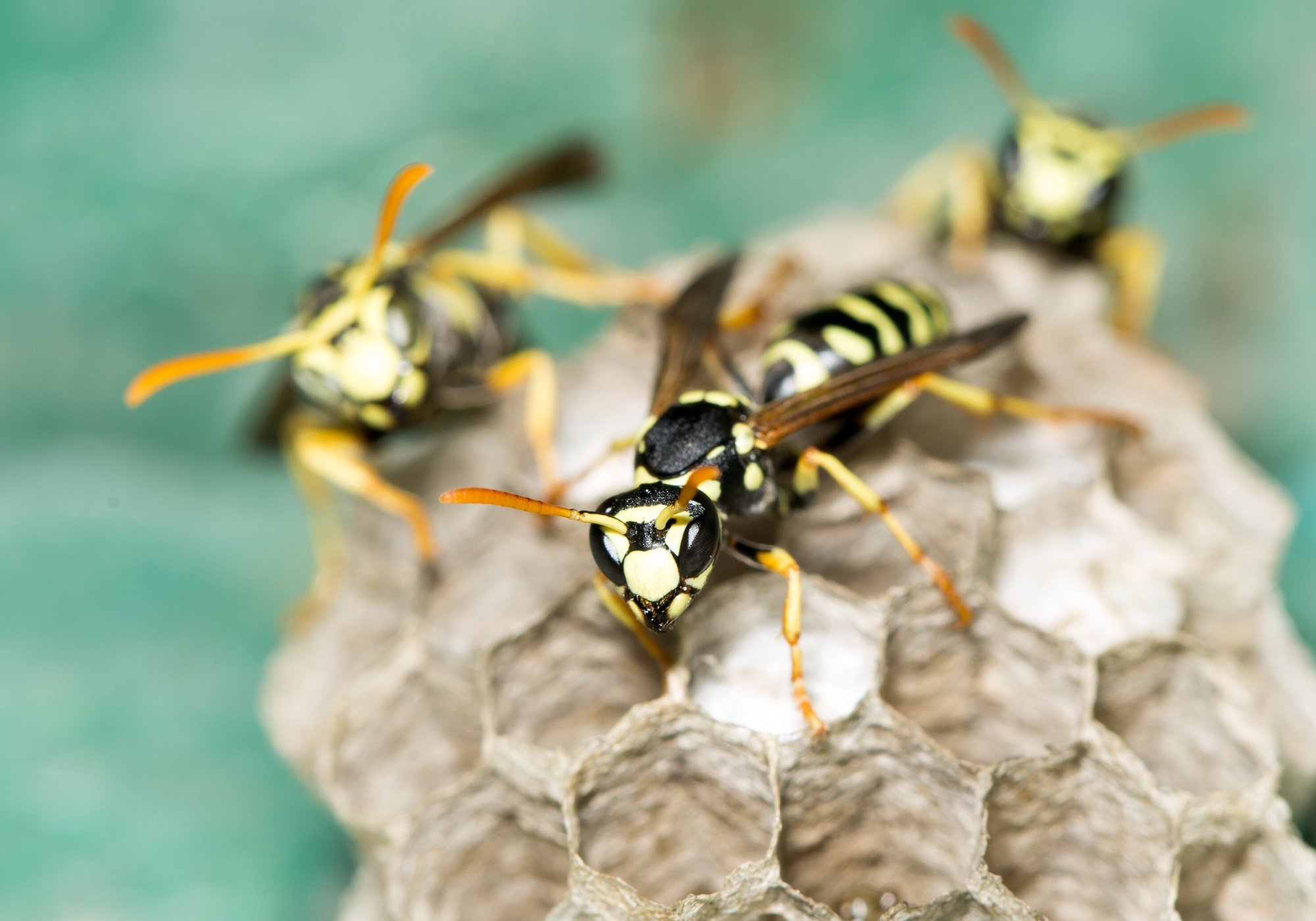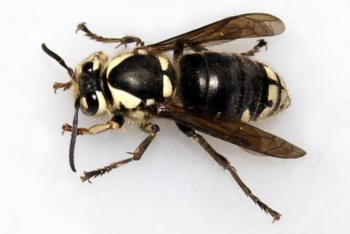Bee, Wasp, Hornet & Yellowjacket Exterminator in Metuchen, NJ 08840

schedule a free estimate
Singing Insect Problem in Metuchen, NJ? For fast service, call Anchor Pest Control, your local wasp, hornet & yellowjacket removal service.
Avoid the hazards of DIY! If you have a stinging insect nest on your property that requires immediate attention, please call our office to speak to a representative. Anchor Pest Control will safely remove stinging insect nests that are currently nesting on your property.
If you have bees, wasps, hornets, yellowjackets, or bees, we can help. No worries if you are unsure what species you are currently dealing with. Without the trained eye of a professional, it may be challenging to identify! Once the stinging insect is correctly identified, an appropriate treatment solution can be customized depending on the nest location, species, and other environmental or structural concerns.
Call us Today for Fast Service.- Safety is our number one priority. Our professional expertise and safety equipment are the best way to remove a nest.
- Our service includes a base charge with a small incremental charge for additional ladder work.
- If you have previously self-treated yellow jackets in wall voids, we can provide service. Please call our office for details.
The good news? Getting rid of stinging insects in your home or business is simpler than you think! Anchor Pest Control offers a range of services to eliminate active bee, wasp, hornet, yellowjacket, and bee infestations and prevent them from returning. Let us help protect your home and family!
For year-round coverage of stinging insects, check out our Pest Protect 365 services. We offer guaranteed coverage and elimination of stinging insects with our Pest Protect Basic, Pest Protect 365 Premium, and All-inclusive services. (Plus, we've also got you covered for 40 insects!)
We also offer convenient online services for wasp, bee, hornet, and yellowjacket removal services. Check out our online shop for fast, easy, guaranteed ant removal service.
How much does it cost to get rid of stinging insects?
And now, for the most pressing question of all… how much will it cost to get rid of an existing stinging insect infestation?
Most pest control companies typically charge around $550 for this service. Please also note that the cost may vary depending on the type of infestation, such as yellowjackets in wall voids or the height of the nest.
At Anchor, we conveniently offer a one-time service to eliminate wasps, hornets, yellowjackets, and bees with a 30-day guarantee that can be conveniently purchased online, and prices start at $375 with an incremental charge for nest removal above the first story of the home or business.
We've also got you covered with our Pest Protect 365 services. These services also offer year-round protection from many pests, including ants, stinging insects, mice, cockroaches, millipedes, centipedes, spiders, earwigs, silverfish, and more. To learn more about our Pest Protect 365 services, fill out the form on this page or give us a call.
Why Choose Us for Stinging Insect Removal?
![]() Fast and reliable service
Fast and reliable service
![]() Safe and effective removal
Safe and effective removal
![]() Identification of nests & elimination so they don't return
Identification of nests & elimination so they don't return
![]() Licensed and insured technicians
Licensed and insured technicians
![]() We'll do the ladder work for reach hard to reach nests
We'll do the ladder work for reach hard to reach nests
For a FREE no-obligation quote, please give us a call or fill out the form on this page

4 Steps to Eliminate Bees, Wasps, Hornets, and Yellowjackets
Step 1:
Don't panic and don't jeopardize your safety with DIY solutions; we've got a guaranteed solution!
Step 2:
Call Anchor Pest Control or fill out the form on this page. For convenience, you may also purchase this service online.
Step 3:
If needed, our pest experts will perform a thorough, FREE, no-obligation inspection of your home. We will identify the type of stinging insect and create a customized plan to remove them.
Step 4:
We will safely eliminate the stinging insects and prevent them from returning.
Our Guarantee
If you are a Pest Protect 365 customer, we've got you covered. We'll quickly dispatch a technician to eliminate the nest at no additional cost.
Our one-time services that are purchased online are fully guaranteed for 45 days.
Wasp, Hornet, and Yellowjacket Information for Homeowners in NJ & PA
Common Stinging Insect Questions
What is the difference between a Yellowjacket and a Wasp?
Yellow jackets are actually the common name of a particular type of wasp. In the US, wasps from the Vespula and Dolichovespula genera are called yellowjackets. Yellow jacket species are smaller than other wasps but more aggressive.
How can I tell the difference between Wasps and Yellowjackets?
The easiest way to tell paper wasps and yellowjackets apart is to watch their behavior. Paper wasps are relatively non-disruptive. They build their small nests onto high structures such as overhangs, roofing, chimneys, or tree branches. Wasps focus on hunting insects, so they’ll rarely approach you. If you leave wasps alone, they’ll probably leave you alone. You may not even notice there’s a wasp’s nest near you until late summer or fall.
Yellow jackets are far more disruptive. They build their nests closer to the ground in sheltered, dark nooks and crannies. They’re also more attracted to garbage and human food than wasps. They gather around sugary liquids, meat, or rotting materials. Yellow jackets range further from their nests and defend themselves more aggressively than paper wasps. Yellow jacket colonies are also simply larger than paper wasp colonies. If you see a lot of wasps around your home, then those wasps are probably yellow jackets.
If you look closely, you can see that the European paper wasps have distinctive orange antennae. Yellowjacket antennae are black.
How did I Get Wasps?
Fences, sheds, eaves, soffits, and gutters on home exteriors are popular wasp nesting spots. Flowers and plant life attract them to yards, as do patios and other outdoor eating areas with crumbs or sticky soda spills that are not cleaned up. Garbage cans that are not adequately covered and regularly emptied also attract wasps seeking food sources. Properties with abundant insects and spiders also provide ample prey for both developing and mature wasps. Contrary to popular but inaccurate beliefs, nests left behind by wasp populations that die during the cold weather months are generally not reused by subsequent generations of wasps.
Why You Shouldn't Self Treat for Yellowjackets.
Most DIY remedies suggest that homeowners get in close contact with the yellow jacket nests to spray or dump the solution into the nest; however, this can be extremely dangerous. You should never get near a yellow jacket nest without the proper safety gear; otherwise, you're subjecting yourself to the possibility of getting stung multiple times.
What is a Bald Faced Hornet?
The bald-faced hornet is a relative of the yellowjacket and gets its common name from its predominantly black color and mostly white face. This stinging insect is named a hornet because of its large size and aerial nest.
A bald-faced hornet infestation is clearly visible with the presence of a nest, which would be suspended above the ground. If there is an infestation, there will also be worker bald-faced hornets flying around the nest and nearby area.
Avoiding contact with these insects is key to preventing getting stung!

Do you remove Honeybees?
If you suspect honeybees are nesting in or around your home, we will contact the NJ Beekeepers Association or the PA Honeybee Association to relocate the nest for free. You can also contact these associations directly.
Do you provide services for Carpenter Bees?
Yes, for more information on Carpenter Bees, click here.
